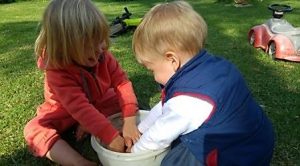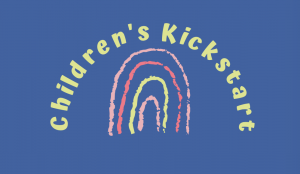Written By Julia Gorham
 As parents, we would like to see our children share with others and this can be frustrating and at times embarrassing, especially when your toddler shouts “mine” and grabs a toy aggressively from his playmate. As far as you are concerned, your child is acting selfishly. Toddlers believe that they are the centre of the world and that everything belongs to them and only them.
As parents, we would like to see our children share with others and this can be frustrating and at times embarrassing, especially when your toddler shouts “mine” and grabs a toy aggressively from his playmate. As far as you are concerned, your child is acting selfishly. Toddlers believe that they are the centre of the world and that everything belongs to them and only them.
Teaching young children for many years, it is a common occurrence to observe toddlers struggling to share, which at times can resort to sudden biting, pushing and scratching amongst themselves. These incidents are obviously upsetting and horrifying for parents. Rest assured, this a challenging task for all toddlers to learn.
As exasperating as these episodes can be, try to be philosophical about them. Your child is acting in perfect keeping with a toddlers old’s view of the world, in which her own things are an extension of herself. Toddlers are beginning to understand possession, and they are developing a strong sense of self, which make ‘mine” and “no” two of their favourite words! Children learn best from role models, encouragement and practise.
In our toddler classroom, toddlers are given daily “grace and courtesy’ groups which is a form of role play which are important lessons, demonstrating good manners and actions towards each other This enables them to better understand how to play, giving them the actions and language to interact with their peers in a positive and fun way. After the teacher has demonstrated “How to share with others”, by acting out a scenario, she will then ask the toddlers to participate in the role play, which they eagerly love to do. It’s great fun and games for them, including special attention too!
These valuable lessons can be practised at home too. When you model good sharing and turn-taking in your family, it gives your children a great example to follow and sharing is a skill they need for play and learning throughout childhood. You can help your child learn to share by giving her plenty of time and opportunities to practise. Praise and encouragement for good sharing will help too.
Here are some ways to encourage sharing in everyday life:
- Play games with your child that involves sharing and turn-taking. Talk your child through the steps, saying things like, “How about I have a turn first to build the tower, then it can be your turn?” or “If you like, you can share those white blocks with me, and ”I’ll share the red blocks with you?”, “How does that sound?” or ”It will be so much more fun, if we take turns”, ”I will start … and then you can….”
- When you see your child trying to share or taking turns, you can say for example, “I liked the way you allowed Johnny to play with your blocks or “I see how you shared …”, “I am so proud of the way you were able to share with ….“, “Well done for sharing with …….”, “Wow”, “You really shared your toys so well with …”
- Sing a sharing song with your child by playfully singing “Sharing is caring”. Make up a simple sharing song to sing with your child, such as by playfully repeating the phrase “Sharing is caring,” or adapting the words to a favourite lullaby. This gives you quality time with your child while stressing the importance of sharing in an enjoyable way.
- Play the fun game “Pass the hot ball “with your children. The main aim is that the children must not have the “hot ball”. Play lively music or sing a song the words:
- “Do you have hot ball, yes or no? “ “Do you have the hot ball, yes or no?” pass, pass pass, pass it all round and go, go, go! “Do you have the hot ball?” and stop! The child who has the “hot ball” is out of the game and the game continues, or when the music stops. No one wants to have the “hot ball”. Play this around the kitchen table using an apple or an orange!
- Talk to your child about sharing before she goes on playdates. For example, you could say, “When Sarah comes to play it would be lovely, if you can share some of your toys with her?”, or “When Sarah arrives, “Why don’t we ask her what toys she would like to play with?”
- Point out to your child how her friend was able to share. E.g. “I noticed how your friend was sharing her toys with you, that’s was very kind of her”.
- Let your child put away his special toys to avoid problems with sharing his favourite play items with his friends.
- Paint Pictures together, sharing paints and paintbrushes.
- If your child doesn’t share well, you can try practising together at home and demonstrate how to share. For example, ‘Let’s share your muffin?”. “You can have the first bite, and then I can have second bite?”
- Another strategy is to stay nearby your child when playing with others, encouraging him to share or how to share.
- It can help to create consequences when children don’t share. For instance, if siblings are fighting over a toy and not sharing, a reasonable consequence might be to take away the toy from both of them for a short period of time.
- When you use consequences for not sharing, it’s important that the consequences relate to the thing that’s being shared – or not shared! For example, if children aren’t sharing a toy car, you might take the car away. Neither child can play with the car, so this feels fair to both. It can also get your children thinking about what they need to do if they want to play with their toy together. When you think they’re ready, you can give the toy back so your children get another chance to show they can share.
Sharing is a vital life skill. It’s something toddlers and children need to learn to make and keep friends and play cooperatively. Once your child starts having playdates and going to child care, preschool or kindergarten, he’ll need to be able to share with others.
Sharing teaches children about compromise. They learn that if we give a little to others, we can get some of what we want as well. Children who share also learn how to take turns and negotiate, and how to cope with disappointments. These are all really important life skills.
By age the ages of three years, children will slowly be able to grasp the concept of turn-taking. Encouragement and practise about sharing will encourage better results for your child. Make it entertaining and light hearted and don’t constantly lecture your child. Your child will realise that a caring and sharing nature will benefit him with strong, lasting friendships.



